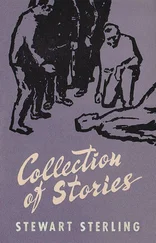The din down below in the street seemed to have increased a hundredfold, meanwhile; he couldn’t be sure whether it actually had or it was just the after-effects of the drugged cigarette making it seem so. Sirens screeching, bells clanging, voices yelling — as though there were a whole crowd milling around out there.
He opened the flat door, and you couldn’t see your hand in front of your face. No lights out in the hall. Then he saw a peculiar hazy blur just a few feet away, up overhead, and realized that there were lights — but the building was on fire. It wasn’t darkness he’d stepped out into, but a solid wall of smoke.
He could possibly have gotten out, still made the street from where he was, by a quick dash down the stairs then and there. Step Lively plus several whiffs of a drugged cigarette, however, was no combination calculated to equal a quick dash in any direction, up or down. He turned around coughing and shuffled back into the flat he had just emerged from, closing the door on the inferno outside.
To do him justice, it wasn’t simply inertia or laziness this time that kept him up there where he was. Hundreds of men in hundreds of fires have hung back to drag somebody living out with them. But very few have lingered to haul out somebody already dead. That, however, was precisely what Step had gone back for. The lady was his corpus delicti and he wasn’t leaving her there to be cremated.
That a fire should start up here and now, in the very building where a murder had been committed, was too much of a coincidence. It was almost certainly a case of incendiarism on the murderer’s part, perpetrated in hopes of obliterating all traces of his crime. “And if he was smoking that devilish butt I picked up,” he said to himself, “he wouldn’t stop to worry about whether anybody else was living in the building or not!”
He retrieved it a second time, what there was left of it, and dropped it in his pocket, pin and all. Then he wrapped the counterpane with the ace-of-diamonds symbol on it around the woman, turning her into a bundle of laundry, and moved toward the door with her. The current failed just as he was fumbling at it with one hand, under her, and the room went black.
A dull red glow shone up the stairwell, though, when he got it open. It would have been all right to see by, but there wasn’t anything to breathe out there any more, just blistering heat and strangling smoke. Spearheads of yellow started to shoot up through it from below, like an army with bayonets marching up the stairs. He got back inside again, hacking and with water pouring out of his eyes, but hanging onto her like grim death, as though she were some dear one instead of just a murdered stranger he had happened to find.
The room was all obliterated with haze now, like the hallway had been the first time, but he groped his way through it to the window. He didn’t lose his head; didn’t even get frightened. That was all right for women or slobs in suspenders, trapped on the top floor of a blazing tenement. “I didn’t come in through the door, anyway,” he growled. He was good and sore, though, about all this hectic activity he was having to go through. “I should ‘a’ been home long ago, and had my shoes off—” he was thinking as he leaned out across the sill and tried to signal to the mob that he could hear, but no longer see, down on the street.
He was hidden from them, and they from him, by the smoke billowing out from the windows below him. It formed a regular blanket between — but not the kind that it paid to jump into. Still, the apparatus must be ganged up down there by this time. You’d think they’d do something about helping a fellow get down, whether they could see him or not. Somebody must have almost certainly spotted him climbing in.
Even if he still had the plank, he couldn’t have made it across on that any more. He not only had her now, but his lungs and eyes were going all wacky with this damn black stuff; he’d have toppled off it in a minute. The crack he’d just made to himself about having his shoes off at home registered. He parked her across the sill, bunched one leg, and started unlacing. It took him about forty-five seconds to undo the knot and slip the oxford off — which for him was excellent time. He poised it and flung it down through the smoke. If it would only bean somebody now, they’d stop and think maybe that shoes don’t come flying down out of a fire unless there’s somebody up there in it alive.
It did. A section of ladder shot up out of the swirling murk just as it left his hand. The helmeted figure scampering up monkeylike met the shoe halfway, with the bridge of his nose, and nearly went off into space. He flailed wildly with one propellerlike arm, caught the ladder once more in the nick of time, and resumed his ascent — a brief nosebleed to add to his troubles. Such language Step had rarely heard before. “Oops,” he murmured regretfully. “Shows it never pays to be too hasty. What I’ve always said.”
The fireman wiped his mouth, growled: “C’mon, step out and over, the roof’s gonna go any minute.” He was on a level with Step’s eyes now, outside the window. The room was about ready to burst with heat; you could hear the floor-boards cracking as they expanded.
Step reared the mummy-like figure, thrust it across the sill into the smoke-eater’s arms. “Take this stiff and be careful of her,” he coughed. “She’s valuable. I’ll be right down on top of you.”
The fireman, hooked onto the ladder by his legs, slung the burden over his shoulder, clamped it fast with one arm, and started down. Step started to climb over the sill backwards. The smoke was worse out here than in the room, he couldn’t see the ladder any more. A silvery lining to the smoke, like a halo all around him, showed they were training a searchlight up from below, but it couldn’t get through the dense, boiling masses. He found a rung with his one stockinged foot, made passes at the air until he’d finally connected with one of the invisible shafts — and the rest was just a switch over. Try it sometime yourself.
Then he stayed where he was until he’d shrugged his coat half-off his shoulders and hooded it completely over his head. Then he went down slowly, blind, deaf, seared, and breathing into worsted a little at a time. He went down ten stories, twenty, fifty — and still the ground wouldn’t come up and meet him. He decided the place must have been the Empire State in disguise. One time he passed through a spattering of cool, grateful spray blown off one of the hose-lines and almost felt like sticking around in it, it felt so good. Just about the time he decided that the ladder must be slowly moving upward under him, like a belt-line or treadmill, and that was why he wasn’t getting anywhere, hands grabbed him at the ankles and shoulders and he was hoisted to terra firma a yard below.
“Bud,” said the Fire Chief patiently, “as long as you were in shape to climb down on your own, couldn’t you have made it a little faster? I’m a very nervous man.”
Step disengaged his head from his coat, kissed himself on the knuckles, bent down and rapped them against the Greenwich Street sidewalk. Then he straightened up and remonstrated: “I never was rushed so in my life as I been for the past half-hour!” He glanced upward at the haze-blurred building, whose outline was beginning to emerge here and there from the haze of smoke.
“The fire,” the Chief enlightened him, turning away, “was brought under control during the half-hour you were passing the third floor. We finally put it out during the, er, forty-five minutes it took you getting from there down. The assistant marshal’s in there now conducting an investigation—” Which may have leaned more toward sarcasm than accuracy, but was a good example of the impression Step made upon people the very first time they encountered him.
Читать дальше












